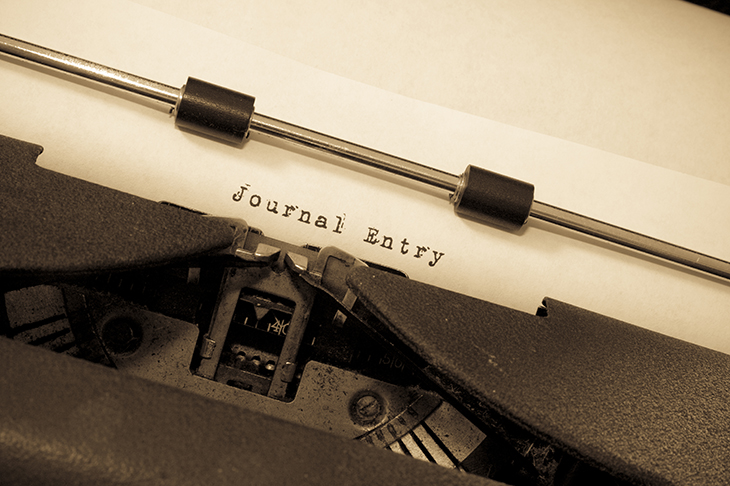At the turn of the century, I started a diary. I’ve mostly typed it on old typewriters, bashing out a sheet of A4 like a hyperactive muppet, without giving any forethought to what I am going to say. The pleasure I get from the daily typed entry is partly mechanical. When the page is done, I punch two holes in the side of the sheet with an antique lever punch, shove it in a box binder and forget all about it. In 18 years I have filled five box binders.
The only people interested enough to read my diary have been female members of my family. They read it when I’m out and they don’t even bother to put it back where they found it. Now and again I recognise a cryptic comment alluding to something they’ve read there. Occasionally I write fantastic things in it just to shock them.
The other day I needed to verify something for tax purposes and I had a look at it myself for the first time. I hoped I might be pleasantly surprised at how the passage of time had lent it a passing interest. It hadn’t. By and large it is a litany of complaint: I’m skint. I’m depressed. I’m bored. I’m ashamed. I’m hungover. I’ve started smoking again. It’s raining. King George V kept a diary. A typical entry was: ‘It rained today, harder than yesterday: I hope it will not rain tomorrow.’ Mine’s like that. And I never seem to learn or change from one year to the next; it’s just the same stuck record. It isn’t even truthful.
The only thing in it worth reading is the odd quotation. The policeman saying to me, as he punched and kicked me out of Stoke City football ground: ‘Penny for your thoughts?’ The psychologist I was sent to in 2003 by a doctor who didn’t believe in antidepressants. She had pushed my buttons for ten minutes, then noticed something strange about my eyes. ‘Can I just say right here,’ she said, ‘that you are entitled to say anything you like to me, but you mustn’t hit me.’ The elderly man standing at the next urinal in the country town’s new public toilets who solicits me with: ‘Would you like to see my puppy?’ The New Age numerologist-psychologist who asked me to pick two numbers between one and ten, and when I said ‘six and seven’ said that the key to my character was instability because I was ‘all at sixes and sevens’. The salesman cold-calling from India who gets me out of the bath to say: ‘Mr Jeremy, have you ever considered writing a will?’
And this, overheard in a country pub in west Wales in 2003: ‘Hallo Dai! Long time no see. Where you been then?’ ‘What do you mean, long time no see, I saw you yesterday.’ ‘Did you?’ ‘You were on the tractor. At the crossroads. I was in the wife’s car. You waved.’ ‘Did I?’ ‘And I saw you — in the post office it was. Sunday morning. You came in for a Mirror.’ ‘I don’t remember that, man.’ ‘And on Saturday I was talking to you in here for ages.’ ‘My God, I don’t remember that either. Well how are you, Dai, anyway?’
Or this from my son’s grandmother, talking about her father in his final year: ‘Once a week he went to see Dr Stanley who took a pint of blood out of him, to relieve the pressure, I suppose, and gave it to him in a plastic bag. He brought it home and put it on his roses. It did them a power of good, said Father. Only next door’s dog used to get over the fence and lick the blood off the roses and make a mess of them. So in the end he just threw the blood in the pedal bin in the kitchen every week.’
Oh, and there is a six-month love affair traced from the first casual glance to its humiliating end. Undeniably these pages do hold a certain toe-curling interest. In Enemies of Promise, Cyril Connolly claims that love at first sight (as this was) ‘is an intuition bred by habit of the person who can do us harm’. And so it proved.
Apart from that, and an enlivening quotation here and there, I seem to have written 2,000 pages of weather, grievance, guilt, narcissism, appointments and shopping — increasingly shopping. So to those of you who find a diary or daily journal in your Christmas stocking, please beware of the future humiliation offered by its seductively pristine pages. Or better still, pass it on next Christmas to someone whose self-esteem can withstand the shock of rereading it.
Got something to add? Join the discussion and comment below.
Get 10 issues for just $10
Subscribe to The Spectator Australia today for the next 10 magazine issues, plus full online access, for just $10.
You might disagree with half of it, but you’ll enjoy reading all of it. Try your first month for free, then just $2 a week for the remainder of your first year.















Comments
Don't miss out
Join the conversation with other Spectator Australia readers. Subscribe to leave a comment.
SUBSCRIBEAlready a subscriber? Log in